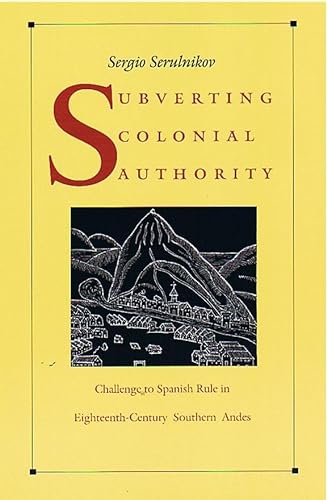Items related to Subverting Colonial Authority: Challenges to Spanish...
Subverting Colonial Authority: Challenges to Spanish Rule in Eighteenth-Century Southern Andes - Softcover

"synopsis" may belong to another edition of this title.
"About this title" may belong to another edition of this title.
- PublisherDuke University Press Books
- Publication date2003
- ISBN 10 0822331462
- ISBN 13 9780822331469
- BindingPaperback
- Number of pages304
- Rating
Top Search Results from the AbeBooks Marketplace
Subverting Colonial Authority: Challenges to Spanish Rule in Eighteenth-Century Southern Andes
Book Description Paperback. Condition: New. Seller Inventory # 0822331462-11-23643260
Subverting Colonial Authority: Challenges to Spanish Rule in Eighteenth-Century Southern Andes
Book Description Paperback. Condition: new. New. Fast Shipping and good customer service. Seller Inventory # Holz_New_0822331462
Subverting Colonial Authority: Challenges to Spanish Rule in Eighteenth-Century Southern Andes
Book Description Paperback. Condition: new. New. Seller Inventory # Wizard0822331462
Subverting Colonial Authority : Challenges to Spanish Rule in Eighteenth-Century Southern Andes
Book Description Condition: New. Seller Inventory # 1760755-n
Subverting Colonial Authority: Challenges to Spanish Rule in Eighteenth-Century Southern Andes
Book Description Paperback. Condition: new. New Copy. Customer Service Guaranteed. Seller Inventory # think0822331462
Subverting Colonial Authority
Book Description paperback. Condition: New. Language: ENG. Seller Inventory # 9780822331469
Subverting Colonial Authority: Challenges to Spanish Rule in Eighteenth-Century Southern Andes
Book Description Paperback / softback. Condition: New. New copy - Usually dispatched within 4 working days. Explores the changing forms of colonial domination and peasant politics in the Andean highlands from the 1740s (the starting point of large political and economic transformations) through the early 1780s, when a massive insurrection of the highland communities shook the foundations of Spanish rule. Seller Inventory # B9780822331469
Subverting Colonial Authority Challenges to Spanish Rule in Eighteenth Century Southern Andes
Book Description Paperback. Condition: Brand New. 287 pages. 8.75x6.00x0.75 inches. In Stock. Seller Inventory # __0822331462
Subverting Colonial Authority: Challenges to Spanish Rule in Eighteenth-Century Southern Andes
Book Description Condition: New. Buy with confidence! Book is in new, never-used condition. Seller Inventory # bk0822331462xvz189zvxnew
Subverting Colonial Authority: Challenges to Spanish Rule in Eighteenth-Century Southern Andes
Book Description Condition: new. Seller Inventory # 4ae7c426e80c9bff24a442befe402369

